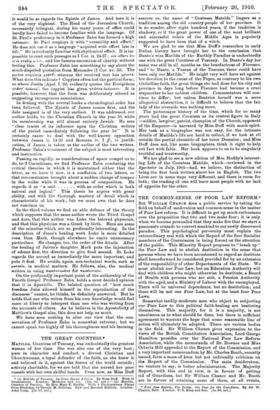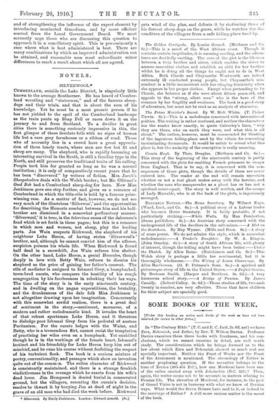THE COMMON-SENSE OF POOR LAW REFORM.* Sin WILLIAM CHANCE does
a public service by taking the field on behalf of moderation and common-sense in the matter of Poor Law reform. It is difficult to get up much enthusiasm over the proposition that two and two make four ; it is only when we become persuaded that they make five that we start a passionate crusade to convert mankind to our newly discovered paradox. This psychological perversity must explain the extraordinary zeal with which the Report of the four Socialist members of the Commission is being forced on the attention of the public. This Minority Report proposes to "break up" the Poor Law and to abolish destitution in the sense that persons whom we have been accustomed to regard as destitute shall henceforward be considered provided for by an extension of the responsibility of other Departments of the State. We must abolish our Poor Law, but an Education Authority will deal with children who might otherwise be destitute, a Board of Health with persons who are sick, a Pension Authority with the aged, and a Ministry of Labour with the unemployed. There will be universal dependence, but no destitution ; and there will be not one Poor Law, but at the least four Poor Laws.
Somewhat tardily moderate men who object to subjecting our Poor Law to this political faith-healing are bestirring themselves. This majority, for it is a majority, is not unanimous as to what should be done, but there is sufficient agreement to warrant the hope that some reasonable line of action will ultimately be adopted. There are various bodies in the field. Sir William Chance gives expression to the views of the British Constitution Association, Lord George Hamilton presides over the National Poor Law Reform Association, while the memoranda of Dr. Downes and Miss Octavia Hill appended to the Report of the Commission, and a very important memorandum by Mr. Charles Booth, recently issued, form a mass of keen but not unfriendly criticism on the Report of the Commission. The main desideratum, we venture to say, is better administration. The Majority Report, with this end in view, is in favour of getting rid of Guardians, but Sir William Chance and Mr. Booth are in favour of retaining some of them, at all events,
• Poor Law Reform, Via Tertia: the Cass for the Guardians. By Sir W. Chance, Bart. London: P. S. King and Son. [la. 6d. net.] and of strengthening the influence of the expert element by introducing nominated Guardians, and by more efficient control from the Local Government Board. We most earnestly urge those who are discussing this question to approach it in a conciliatory spirit. This is pre-eminently a case where what is best administered is best. There are many combinations by which an improved administration can be attained, and reasonable men must subordinate minor differences to reach a result about which all are agreed.











































 Previous page
Previous page